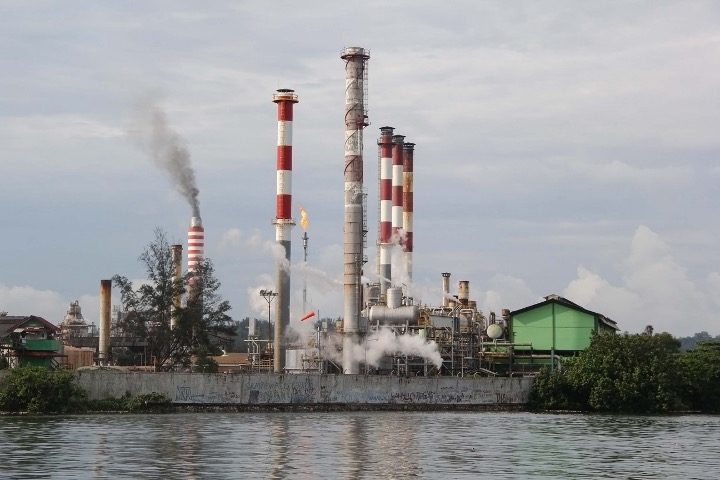
The Biden administration is now a “house divided,” as its ostensible environmental ideals clash with the energy realities confronting the nation.
The White House promised it would cease funding oil and gas projects abroad and instead prioritize policies to cut down on carbon emissions and thus combat “climate change.”
But, as Politico notes, the administration is walking back those promises. Federal agencies have greenlighted foreign fossil-fuel proposals, such as fixing up an Indonesian oil refinery and sending natural gas to Poland. Such proposals have reportedly elicited the ire of Joe Biden’s climate envoy, John Kerry, as well as the disappointment of Democrats on Capitol Hill.
“The Biden administration continues to approve one fossil project after another, which completely undermines our international dialogue for a faster transition to renewables and undermines our credibility,” said Sen. Jeff Merkley (D-Ore.), an advocate for “green” policies who has called on the White House to provide further information on its funding for the oil and gas projects.
Biden apologists, however, say the White House’s shift is one predicated on pragmatism and that it is inescapable in the face of the impact of the Russia-Ukraine War on global energy markets, as European nations are heavily dependent on Russian oil.
Landon Derentz, who worked on international energy policy at the state and energy departments during the Obama, Trump, and Biden administrations, defended Biden, telling Politico, “No one’s overlooking the climate consequences of these policies, but they are being weighed against the broader foreign policy, economic policy and security policies in United States.”
The outlet interviewed 21 individuals, some White House officials, others lawmakers, and still others lobbyists, Capitol Hill aides, and advisors to federal agencies or environmental groups. The Biden administration’s actions have the community split down the center.
For example, in late April, when the U.S. Export-Import Bank was considering whether to approve $100 million in financing for the renovation of an Indonesian oil refinery, Kerry and Jon Finer, the deputy national security advisor in the White House, tried to get Ex-Im chair Reta Jo Lewis to pull the project from the agenda and delay the decision because they believed it to be at odds with Biden’s climate aims.
But financing had already been approved, and the project was approved over the opposition of Kerry and Finer.
As Politico noted of the dilemma the White House faces as its environmental ideas are tested by hard reality:
Although an overwhelming majority of the administration’s financing flows to clean energy projects overseas, bankrolling oil and gas projects threatens to prolong the use of planet-heating fossil fuels that scientists say need to be phased out by mid-century to avoid catastrophic climate change. Activists say that’s especially concerning for regions like Southeast Asia and sub-Saharan Africa, where emissions are projected to grow while those from the advanced economies shrink.
… The war in Europe has dovetailed with U.S. efforts to counter China’s ambitions to grow its influence through its Belt and Road Initiative, an overseas infrastructure investment strategy. Though its energy spending abroad has slowed in recent months, Beijing holds a sizable chunk of the developing world’s debt as a result of that effort, which has included a focus on energy-intensive projects.
Kevin Gallagher, director of Boston University’s Global Development Policy Center, had served on Ex-Im’s China advisory council, but stepped down due to his disagreement with the funding of the Indonesia project.
“There’s a disconnect between that and the actions of a lot of these agencies precisely because there isn’t a clear process,” said Gallagher. “These exceptions should be true exceptions. But to just call anything ‘security’ is just going to lead to insecurity in the future.”
A lack of clarity is a recurring theme in the Biden administration. Although the White House is ostensibly funding these oil and natural gas projects to play catch-up with Russia and China, this comes after Biden deliberately decimated America’s energy independence and sovereignty — to China’s benefit — immediately upon occupying the Oval Office.
As The New American recently reported, U.S. Energy Secretary Jennifer Granholm met with her Chinese counterpart, China National Energy Administration Chairman Zhang Jianhua, right before the administration’s 2021 announcement that it would release oil from the Strategic Petroleum Reserve (SPR) to fight nationwide high gas prices caused by Biden’s own energy policies.
Per calendars obtained by Americans for Public Trust (APT), Granholm spoke with Jianhua, who is a longtime member of the Chinese Communist Party (CCP), on Nov. 19, 2021. They had another conversation on Nov. 21.
While the content of these meetings is not known, the news suggests that the White House may have discussed its plans with Beijing and was thus influenced by the communist regime in making policy decisions that have weakened America’s energy independence while simultaneously strengthening China’s global position.
Thus, the White House’s assertion that it finds itself in a conundrum when it comes to energy rings hollow, as it was Biden who caused the problem due to his fixation on radical climate change ideology and his tacit allegiance to Beijing.




